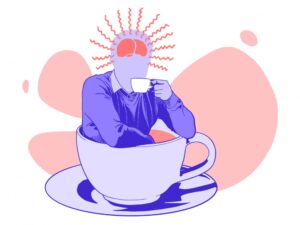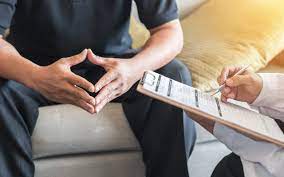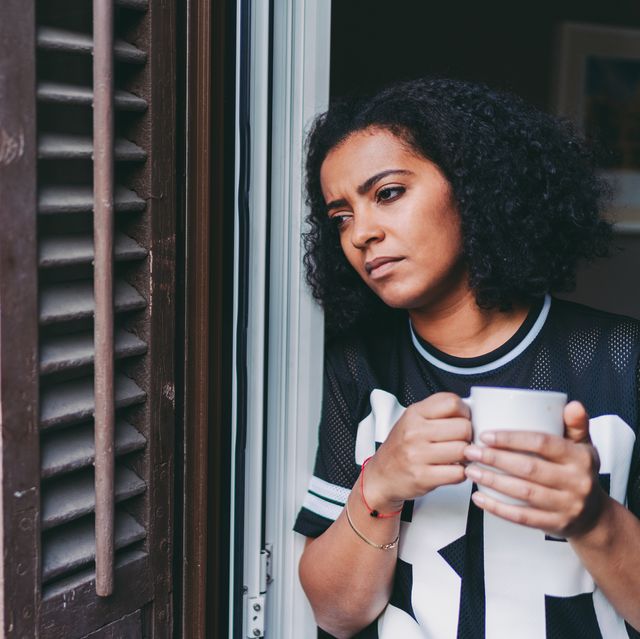Do you ever get that feeling of anxiety in the pit of your stomach? Maybe it’s a tightness in your chest or a feeling like everything is just too much. For some people, caffeine can make these symptoms worse. In this blog post, we will discuss how caffeine affects your anxiety levels and provide some tips for reducing anxiety without giving up caffeine altogether.
Contents
Defining Caffeine And Anxiety
 Caffeine and anxiety are two terms that are often used together. But what exactly is caffeine, and how does it affect anxiety levels?
Caffeine and anxiety are two terms that are often used together. But what exactly is caffeine, and how does it affect anxiety levels?
Caffeine is a stimulant that occurs naturally in coffee beans, tea leaves, and cocoa beans. It can also be found in some energy drinks, sodas, and over-the-counter medications. When consumed, caffeine leads to increased alertness and energy.
Caffeine works by blocking adenosine, a neurotransmitter that promotes sleepiness. It also increases the release of other neurotransmitters like dopamine and norepinephrine, which can improve mood and vigilance. A study by APA found that there are four disorders related to caffeine, these are:
- caffeine intoxication
- caffeine withdrawal
- sleep disorders
- anxiety disorders
Although, there are some benefits of intaking caffeine too much of anything is never good. When it comes to caffeine and anxiety, it is a common misconception that caffeine can help reduce anxiety levels. When in fact, it does the opposite.
Symptoms Of Anxiety Caused By Caffeine
There are many symptoms of anxiety caused by caffeine. Some people may experience only a few of these symptoms, while others may experience many. The most common symptoms include:
- Restlessness
- Nervousness
- Irritability
- Insomnia
- Muscle tension
- Headaches
- Sweating
- Heart palpitations
- Dizziness
- Gastrointestinal problems such as diarrhea or upset stomach.
According to studies, anxiety is one of the most commonly reported side effects of caffeine. In one study, researchers found that anxiety was reported by 17% of people who consume caffeine regularly.
While some people may be able to tolerate high levels of caffeine without experiencing any negative effects/. Others may find that even small amounts of caffeine can cause them to feel anxious.
So, it is important to experiment with different levels of caffeine to see what works for you. If you find that even small amounts of caffeine make you feel anxious, it may be best to avoid caffeine altogether. And if the intake of caffeine makes it difficult to function in day-to-day life. Seek help and find ways to manage it.
Link Between Caffeine And Anxiety
 It is believed that caffeine and anxiety are linked because caffeine is a stimulant. Caffeine can cause your body to release adrenaline, which can lead to feelings of anxiety. Caffeine can also make it difficult for you to relax and may cause you to feel restless or jittery. Some of the relationships between caffeine and anxiety are:
It is believed that caffeine and anxiety are linked because caffeine is a stimulant. Caffeine can cause your body to release adrenaline, which can lead to feelings of anxiety. Caffeine can also make it difficult for you to relax and may cause you to feel restless or jittery. Some of the relationships between caffeine and anxiety are:
- make you more anxious than usual.
- can worsen anxiety symptoms.
- can cause panic attacks in people with panic disorder
- People with a social anxiety disorder may feel more anxious after drinking caffeine.
- make it difficult to fall asleep, which can lead to anxiety.
- also interact with medications used to treat anxiety, such as benzodiazepines.
On average, caffeine is connected with anxiety in order to lead a normal life. So, it is important to be aware of your caffeine consumption. And how it might be affecting your anxiety levels. If you are struggling with anxiety, talk to a mental health professional about whether cutting back on caffeine may help.
Moreover, you should also keep in mind that anxiety is different for everyone. What works for one person, may not work for another. So, it is important to experiment and find what works best for you.
Sudden withdrawal symptoms
Moreover, if you suddenly quit caffeine, you may experience withdrawal symptoms. These can include:
- fatigue
- drowsiness
- depressed mood
- tremors
These symptoms can last for a few days to a week. If you rely on caffeine to help you get through the day, it’s best to wean yourself off gradually. This will help minimize withdrawal symptoms. Because sudden withdrawal can make you feel even more tired and anxious.
So, it is important to be mindful of your caffeine consumption. If you find that it’s impacting your anxiety levels, it may be best to cut back or quit altogether. Caffeine is a stimulant and can therefore increase anxiety levels. Thus, it’s important to be mindful of your intake, particularly if you’re prone to anxiety.
How Much Caffeine You Should Intake?
 If you are intaking too much caffeine, it could be the reason for your anxiety. The recommended amount is 400mg a day, which is about four cups of coffee. If you are having more than that, it might be time to cut back. And also, be mindful of the other sources of caffeine you are consuming such as soda, tea, and chocolate.
If you are intaking too much caffeine, it could be the reason for your anxiety. The recommended amount is 400mg a day, which is about four cups of coffee. If you are having more than that, it might be time to cut back. And also, be mindful of the other sources of caffeine you are consuming such as soda, tea, and chocolate.
There are beverages outside the home that contain caffeine such as energy drinks. Also, other examples include:
- 8 ounces of decaf caffeine contains about 12 mg
- One ounce of “energy shot” has about 142 mg
- A 16-ounce energy drink has about 160 mg
- 12 ounces of caffeinated soda has about 35 mg to 55 mg.
- 8 ounces of espresso coffee has about 100 mg to 150 mg
- 32 ounces of iced tea has about 47 mg to 165 mg
- 16 ounces of brewed tea has about 14 mg to 60 mg.
Even though these products have caffeine in them, it is still a good idea to limit your intake. Too much caffeine can lead to anxiety and other health problems. It is best to stick to the recommended amount or less.
Now that you know how much caffeine you should intake, let’s look at how caffeine affects your anxiety levels.
Tips To Manage Your Caffeine Intake
It is important to keep in mind that everyone metabolizes caffeine differently. So, what may be a safe amount of caffeine for one person, could cause anxiety or other issues for another. If you are someone who is susceptible to the effects of caffeine, it is important to be mindful of your intake.
Here are a few tips to help you manage your caffeine intake:
Know your sources of caffeine
It is not the case that caffeine comes only from coffee. There are other sources of caffeine including tea, soda, energy drinks, chocolate, and some medications. Be aware of all the sources of caffeine in your diet so that you can better control your intake. In fact, it is essential to be aware of anything that contains caffeine, as even small amounts can have an effect.
Track your intake
 Keep a running tally of the caffeine you consume in a day. This will help you to be more mindful of your intake and make sure that you are not consuming more than you realize. Also, you can try journaling how you feel after consuming caffeine. This will help you to identify any patterns between your anxiety levels and caffeine consumption. You can do this by making journal entries every time you have caffeine, noting the type and amount, as well as how you feel both mentally and physically.
Keep a running tally of the caffeine you consume in a day. This will help you to be more mindful of your intake and make sure that you are not consuming more than you realize. Also, you can try journaling how you feel after consuming caffeine. This will help you to identify any patterns between your anxiety levels and caffeine consumption. You can do this by making journal entries every time you have caffeine, noting the type and amount, as well as how you feel both mentally and physically.
Limit your intake
If you are someone who is sensitive to the effects of caffeine, it is important to limit your intake. This may mean cutting back on your coffee or soda consumption or avoiding energy drinks altogether. Determine what is a safe amount for you and stick to it. It is essential to listen to your body and know what it can handle. However, if you are very fond of caffeine, then, it might be difficult for you to give it up altogether, and that is okay. Just be mindful of your intake and try to limit it as much as possible.
Pay attention to how you feel
Caffeine can affect people differently. Some people may feel more anxious after consuming caffeine, while others may not notice any difference. Pay attention to how you feel after consuming caffeinated beverages and make adjustments to your intake as needed. Moreover, if you are feeling particularly anxious, it may be best to avoid caffeine altogether.
Switch to other beverages
If you find that caffeine is affecting your anxiety levels, it may be helpful to switch to other beverages. There are plenty of caffeine-free options available including herbal teas, fruit juices, and water. In fact, other beverages can actually be more beneficial for your health in general. So, if you are looking to improve your overall well-being, ditching the caffeine may be a good place to start.
Start with small amounts
If you are trying to increase your caffeine intake, it is important to start with small amounts. gradually increasing your intake over time. This will help you to better gauge how your body reacts to caffeine and avoid any negative effects. However, if you find that even small amounts of caffeine make you anxious, it may be best to avoid it altogether. In fact, it is always best to err on the side of caution when it comes to caffeine and anxiety.
Seek professional help
 If you are struggling to control your caffeine intake or if you are experiencing severe anxiety, it is important to seek professional help. A mental health professional can provide you with the support and guidance you need to manage your anxiety and make healthy lifestyle choices. A professional in the specific area of anxiety disorders. There are many ways to get help, so do not hesitate to reach out. It can actually be very helpful to talk to someone who understands what you are going through.
If you are struggling to control your caffeine intake or if you are experiencing severe anxiety, it is important to seek professional help. A mental health professional can provide you with the support and guidance you need to manage your anxiety and make healthy lifestyle choices. A professional in the specific area of anxiety disorders. There are many ways to get help, so do not hesitate to reach out. It can actually be very helpful to talk to someone who understands what you are going through.
Stay calm and positive
Caffeine can be a part of a healthy diet, but it is important to be mindful of your intake. If you are sensitive to the effects of caffeine, there are plenty of ways to manage your intake and avoid any negative effects. Remember to stay calm and positive. Also, it is important to understand that mental health is a journey and everyone’s experience is unique. This process takes time as it might be necessary to experiment with different methods and find what works best for you. Most importantly, do not give up hope. There is always light at the end of the tunnel.
So, these are some ways in which caffeine can affect your anxiety levels. Be mindful of your intake and make sure to pay attention to how you feel after consuming caffeinated beverages. If you find that caffeine is affecting your anxiety, there are plenty of ways to manage your intake. You just need to find the right one that will do wonders for you.
Conclusion
Conclusively, caffeine and anxiety are interconnected. Caffeine can worsen anxiety symptoms and trigger panic attacks in people who are susceptible. However, not everyone experiences the effects of caffeine. And some may find that it actually improves their anxiety symptoms. If you’re struggling with anxiety, it’s important to experiment with different coping mechanisms to see what works best for you.
However, if you find that caffeine makes your anxiety worse, it’s best to avoid it altogether. There are plenty of other ways to get through the day without resorting to coffee or energy drinks. Talk to your doctor about other options if you’re struggling to manage your anxiety.
For more information, please contact MantraCare. Anxiety is a common mental health condition characterized by persistent feelings of worry, fear, and apprehension. If you have any queries regarding Online Anxiety Counseling experienced therapists at MantraCare can help: Book a trial Anxiety therapy session


